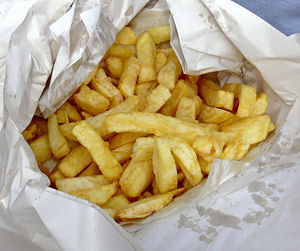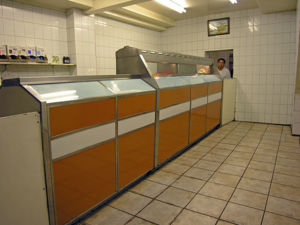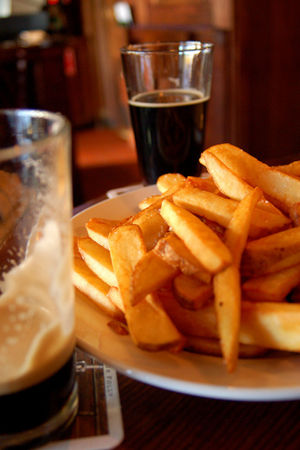Chips (food)


See potato chip for the crispy snack.
A chip is a strip of skinless potato that is grilled, deep-fried or baked until its outside is crisp and approaching golden brown in colour. Chips are a very popular snack, side order or accompaniment to fish, chicken or red meat in the United Kingdom, Ireland and many other nations, particularly those formerly part of the British Empire, now members of the Commonwealth of Nations. Fish and chips is a particularly popular combination in the UK; this meal will always include deep-fried chips when purchased from a takeaway (where food is bought for consumption off the premises), whereas at home, oven chips may be used instead. These are baked rather than fried, so are considered healthier.[1]
Chips are very similar to French fries, the distinction being that fries are usually thinner; in some cases, food sold as fries in the USA and other countries would be recognised as chips elsewhere. Also, the context of eating varies, with fries confined to American-style restaurants in countries where chips predominate.
Buying chips
The British overwhelmingly prefer oven or deep-fried chips, the latter usually fried in beef dripping - entailing a crisis of conscience for chip-loving vegetarians - or olive oil. Chip shops may sell chips and their accompaniments wrapped first in greaseproof paper, then in newspaper. However, this practice of using yesterday's paper is dying out amidst hygiene fears; instead, chips may be sold in plastic containers that may contribute to global warming. It is difficult, then, to enjoy chips without relaxing principles of environmentalism; however, birds and other animals may be fed with chips, providing an alternative source of food for local animals.
In recent years, microwave chips have entered the market. These chips, which are sold in a box, may be eaten directly from the packaging. They are yet to supplant other types of chips.
Eating
Chips may be eaten with a knife and fork, though in informal surroundings it is possible to eat them with fingers; chip shops provide an optional wooden fork. Chips are easy to handle because, unless undercooked, they will always remain straight even when a little pressure is applied. Salt, pepper, vinegar and ketchup may be added, alongside mushy peas. Two or more people may share a plate of chips; in the UK, this may even be considered romantic. Diners will add salt, pepper, vinegar and ketchup themselves - handing around this bottle of tomato sauce - though in chip shops the server may well add salt and pepper themselves. Ketchup may be squirted into one area, or spread liberally all over the chips.
Place in society
Chips, unlike most foods, have fewer associations with particular social classes in the UK. Though social climbers may shun chips because they identify them with the lower classes,[2] people of all walks of life may be seen enjoying chips and purchasing them in fish and chip shops; as in many pubs, it is not at all unusual to see people of obviously different backgrounds in the queue. Chips may also be served as part of a pub meal alongside beer.[3] Social climbers and up-scale restaurants may insist on calling them 'chipped potatoes'; this may be regarded as pretentious. Additionally, the practice of dressing them up as haute cuisine - see the gallery of French fries - might be seen as a little bit vulgar in the UK, possibly receiving a cool reception amongst socially aware chip-eaters.
Health issues
Unfortunately, "chips with everything" is a popular UK saying indicating how a love affair with chips may contribute to poor health; their presence in British schools has contributed to the poor diet of some children. When eaten in large quantities, they are considered junk food.[4] However, their impact on British culture is overwhelming and all-pervasive, meaning that chips are unlikely to disappear anytime soon; for example, according to fish and chip promoters, this meal was a decisive force in defeating Adolf Hitler and winning the Second World War.[5]
Footnotes
- ↑ The Guardian: 'So you fancy chips with everything? Go ahead'. 11th January 2007.
- ↑ Fox R (1999: 1).
- ↑ Fox K (1996: 17).
- ↑ jamieoliver.com: School Dinners - Amnesty. Jamie Oliver is a celebrity chef who campaigns against junk food in British schools. He is seen on this site in 'fat' make up eating chips to highlight their dangers.
- ↑ Seafish Industry Authority: 'On Plate - Fish & Chips. This organisation provides support and advice on how to prepare seafood, which may include chips.
References
- Fox K (1996) Passport to the Pub: the Tourist's Guide to Pub Etiquette. London: Brewers and Licensed Retailers Association. Also published on the Social Issues Research Centre website.
